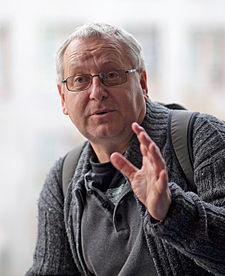
Wanderer of the Landscape Václav Cílek Celebrates Sixty Years
Prague - In his texts, he combines geology with history, botany with aesthetics, or landscape ecology with philosophy. Geologist and climatologist Václav Cílek writes scientific publications, but also books for the general reader interested in landscapes. His knowledge fascinates and his subtle humor entertains. Cílek lectures in the Czech Republic and around the world, often appearing in the media. Perhaps the last polymath, he also led the Geological Institute of the Academy of Sciences of the Czech Republic from 2004 to 2012. On Thursday, he will celebrate his sixtieth birthday.
Cílek consistently follows several themes, such as changes in the Czech landscape, climate change, and environmental issues. In his books, one can find overlaps into literature, religious studies, philosophy, theology, visual arts, or music of all genres. He has collaborated on more than thirty book titles and also publishes his work in several magazines, such as Vesmír and Respekt.
His texts occasionally venture beyond the bounds of ordinary rationality: "I believe that the animal of the Earth has a heart, and I do not know what more I should add," he wrote, for example, in the 2012 book 'Prohlédni si tu zemi' (Look at This Land).
Cílek's mysticism, which once complicated his scientific work at the Geological Institute, is also reflected in the titles of some books: for example, 'Orpheus - A Book of Underground Rivers', 'Archeus', 'Fragment of the Joyful Science of Dwarfs', 'Sacred Landscape: Essays on Places, Forces, and Dragons', or 'Stones and Stars.'
"Metaphysics from the Academy of Sciences" brought Cílek, born on May 11, 1955, in Brno - Židenice, to geology through his father. "He was a geologist working in a mine in Ostrava, and I used to visit him at a house that was half-collapsed as Ostrava settled. Through the cracks in the walls, you could almost see into the industrial landscape from the hallway," he reminisced.
He also studied at a high school - English-Swahili - in Tanzania, where his father worked for a period. After that, he graduated from a mining technical school in Příbram and completed his geology studies at the Faculty of Science at Charles University (1979).
After school, in 1980, Cílek joined the Mining Institute of the Czechoslovak Academy of Sciences and from 1990 worked at the Institute of Geology and Geotechnics of the Czechoslovak Academy of Sciences, now the Geological Institute of the Czech Academy of Sciences, where he was primarily interested in lunar rocks and karst sediments and minerals.
Since the mid-1980s, Václav Cílek has been dealing with various aspects of environmental geology, often in collaboration with natural scientists from various fields and archaeologists. He has gradually moved from scientific work into the field of science popularization. Politicians, businessmen, and scholars invite him to give lectures, and he expresses his views on various current issues of the time.
He regularly appears in popular and slightly philosophical programs on Czech Television about landscapes. He has been a guide for programs such as 'Wandering Old Paths', 'Avenues as Part of Our Landscape', 'Stones in the Czech Landscape', and 'The River in the Flow of Time', as well as the series 'Underground Bohemia' and 'Underground Bohemia II', in which he has also contributed as an author.
On Czech Radio, he is often one of the commentators on the program 'How it Looks to...,' and he also gives lectures on the station Český rozhlas Plus (formerly Leonardo). He has also written a number of textbooks and professional publications, translated several Chinese Taoist texts, and co-authored many scientific works.
The most famous "wanderer of the landscape," Cílek lives in Prague and has two daughters, the younger of whom, Eliška, is a music composer. For his two books, 'Inner and Outer Landscapes' and 'Makom: A Book of Places,' he received the Tom Stoppard Prize in 2004, awarded to authors of Czech origin for essayistic works. In addition, he was awarded the Minister of the Environment's Prize for his significant contribution to the popularization of Czech science and the VIZE Foundation Award.










